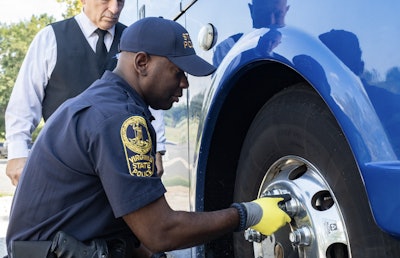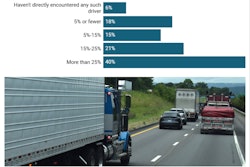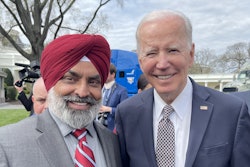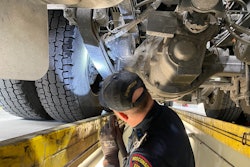
Between an $800 million fraud apocalypse that's becoming a "public safety crisis" to a backlog of "unscrupulous" CDL schools licensing bad drivers, a big decision on broker transparency waiting and a full-on overhaul of the entire broker/carrier/service provider entity registration system, the Federal Motor Carrier Safety Administration has a lot on its plate in 2025.
Add to that rolling out new guidance on English language proficiency enforcement and a review of every state's policies around issuing non-domiciled CDLs, personally ordered by the President.
FMCSA has to do all of it, along with routine safety enforcement and administration, now with less staff. The staff cuts follow years of FMCSA claiming to industry watchers that it simply doesn't have the manpower to tackle fraud and/or a myriad of other issues. With new efforts around fraud ramping up over the last year and more, might the agency need more, not fewer staff?
FMCSA confirmed some staff have taken voluntary buyouts or early retirements this year. Overdrive knows of cuts in the communications office and the Office of Registration, which is currently in the very early stages of an ambitious rollout of a new registration system.

"The Department of Transportation is working closely with DOGE to use every tool at our disposal to cut waste, fraud, and abuse while simultaneously investing in our core mission of safety, finding new efficiencies, and unleashing a wave of innovation," a U.S. DOT spokesperson said. "This is just one key step in that process as we work hand in hand to bring the federal government into the 21st century."
[Related: What should Trump and Elon Musk's DOGE tackle in trucking?]
FMCSA not only has fewer staff now thanks to early retirements. In fiscal year 2026, FMCSA projects a full 7% fewer employees overall if its 2026 budget request is approved.
FMCSA plans to cut 16 staff from the Office of the Administrator, 39 from the Office of Administration, and remove entirely the Office of the Chief Technology Officer.
FMCSA hasn't had an appointed administrator since March, when the last acting administrator stepped down just two weeks after officially stepping into the role. The Trump administration nominated Derek Barrs, a former Florida Highway Patrol Chief, to run the organization in late March, but the nomination hasn't even left Senate committee.
FMCSA's Office of Administration takes care of acquisitions, security, human resources, management and information services, as well as some training. FMCSA's 2026 budget request funds for that office at levels similar to past years but removes nearly half the staff.
FMCSA's Office of the Chief Technology Officer will see some "consolidation," according to the budget, which requests $63 million for technology but $0 for salaries.
FMCSA's CTO office budget request "supports the ongoing partnership with the Department’s Office of the Chief Information Officer (OCIO), to centrally consolidate the management of certain Department level information technology services."
In other words, the CTO office will likely see its people centralized in a new DOT CIO office, where they'll still work on FMCSA business. The budget further outlines the CTO's work to sunset "legacy" technology systems and improve usability through "customer-centric" new platforms.
[Related: Part of anti-fraud bid, FMCSA to introduce Motus, new one-stop shop for carrier business]
Staffing where it counts: FMCSA auditors, investigators, other enforcement personnel
As for boots-on-the-ground employees in the Office of Safety, where about 75% of FMCSA employees actually work, FMCSA seeks just a small change of 845 employees in 2026 vs. 852 in 2025.
The Office of Safety "conducts investigations on truck and bus companies to determine their level of compliance at the time of the investigations," according to the budget estimates, with most office staff in field offices.
"The Office of Safety also has 134 staff at the southern border to carry out inspections of CMVs entering the U.S. at 26 inspection facilities to ensure compliance with the Federal Motor Carrier Safety Regulations (FMCSRs) and Hazardous Materials Regulations (HMRs)," according to the budget request. That office also audits Mexico-domiciled carriers, and carried out 122,000 such audits in 2023.
FMCSA wouldn't comment on the budget process, but did provide further comment on the buyouts.
"FMCSA remains confident in its ability to carry out its mission, including safety enforcement, regulatory oversight, outreach and education, and stakeholder engagement," a spokesperson said.
Overdrive contacted a few working haulers for a gut check on FMCSA's staffing decline, and found many thought necessary work could still get done.
"They do nothing to help us," owner-operator Brian Woodring said of FMCSA. Woodring has long been an outspoken advocate against fraud in brokered freight transactions. "They can close the department down and it would not affect anything."
Superload specialist owner-operator Lee Schmitt, who late last year threw his hat in the ring to lead FMCSA, also saw structural problems with FMCSA and called for a more "customer-centric" model.
FMCSA staff "should be interacting with carriers/drivers and investigating fraud claims," Schmitt said. "The website should have the complaint department on the first page, easy to find. Our industry would be able to better police itself. Let the computers do the other stuff."
Other industry participants showed more concern. With a bill now moving through the Senate (the Household Goods Shipping Consumer Protection Act, or HGSCPA) that would empower FMCSA to fine bad actors $10,000 for double brokering and lying on registration forms, perhaps FMCSA needs more staff, not less.
[Related: New bill would let FMCSA fine double brokers $10,000, crack down on shady actors]
The Transportation Intermediaries Association, one of the HGSCPA's biggest backers, said FMCSA's "long-overdue efforts to strengthen registration integrity, build out a dedicated fraud team, and enhance broader safety measures are a welcome development." The advancement of the bill TIA viewed as "an important step toward equipping FMCSA with stronger enforcement tools."
Said TIA VP of Government Affairs Daniel Hoff, "While budgetary changes at any agency can raise questions, it’s important to emphasize that carrier safety remains the FMCSA’s core mission -- with renewed focus on preventing cargo theft and strategic fraud."
Raman Dhillon, CEO of the North American Punjabi Trucking Association, recently told Overdrive about meeting with President Joe Biden and DOT leadership and pleading with them to clean up the CDL credentialing system. Dhillon reported CDL schools in his area that blatantly skirt the Entry Level Driver Training requirements to FMCSA for years to no avail.
"Simple things" to police, he felt. "You know the location [of the reported schools], you know the area, you know everything we provided you -- you can’t just even go there and take a look at it?" Dhillon recalled of his conversations with FMCSA: "Every time," FMCSA's response was "it's just lack of manpower."
Dale Prax, the self-described "worst critic" of FMCSA and purveyor of his own broker/carrier entity vetting system, said FMCSA had told him the Office of Registration "had been operating at full staff -- until recently. A reduction of two employees has now left that critical department with just three staff members."
[Related: FMCSA's confusing excuse for not enforcing its own rules]
If the HGSCPA legislation passes and "FMCSA regains the authority to impose civil penalties on double brokers, fraud rings, and identity thieves -- enforcement demands will grow significantly," Prax continued. "The agency will need more boots on the ground, not fewer."
Throw in the Unified Registration System modernization initiative along with other tech modernization efforts and "it’s clear: properly vetting new registrations will require more trained staff, better systems, and stronger oversight," said Prax.
Prax said he had volunteered to work with FMCSA to tackle fraud, but the agency hasn't taken him up on the offer so far.
[Related: Hundreds of CDLs sold for cash to illegal immigrants: Florida AG]









